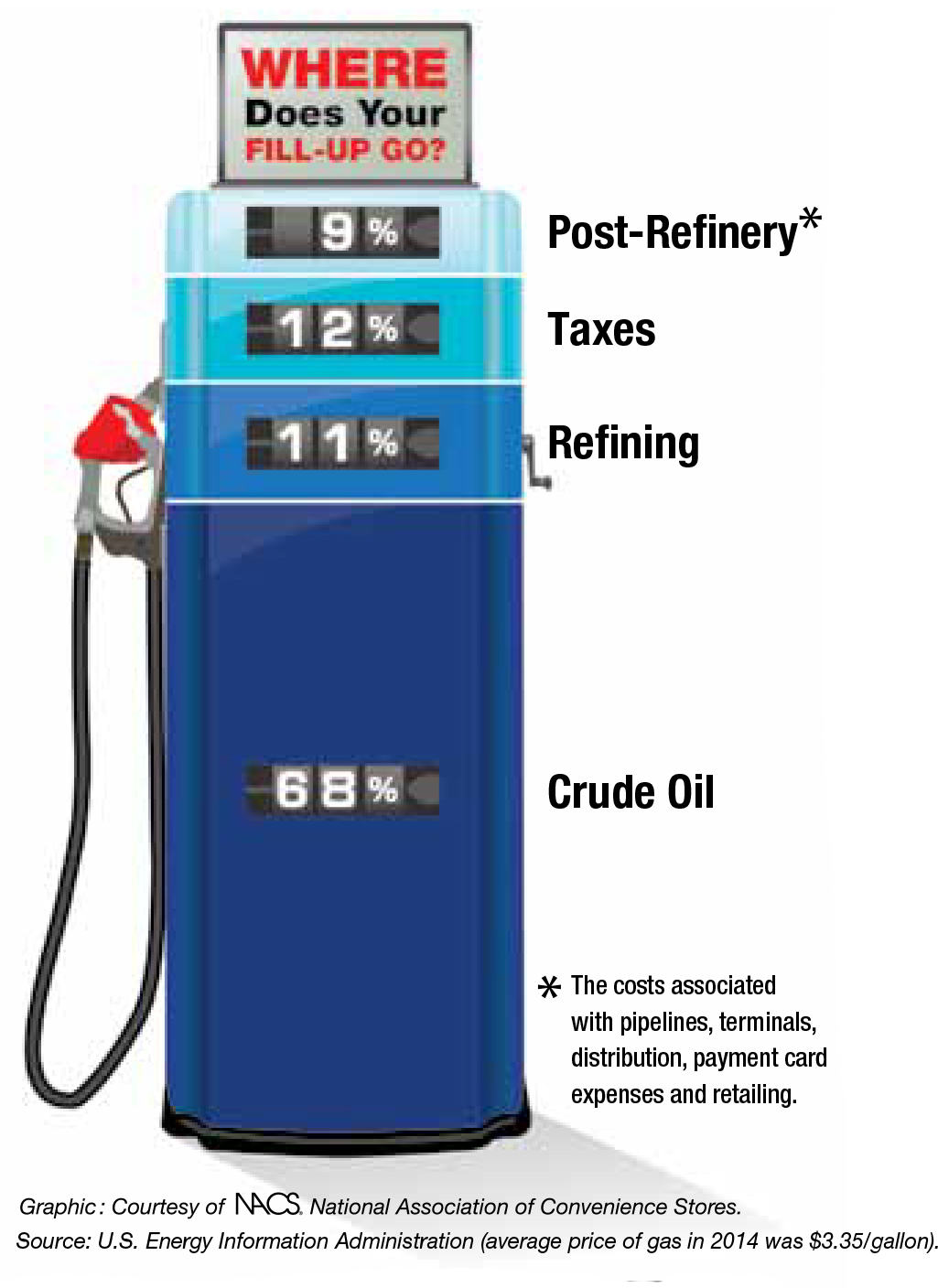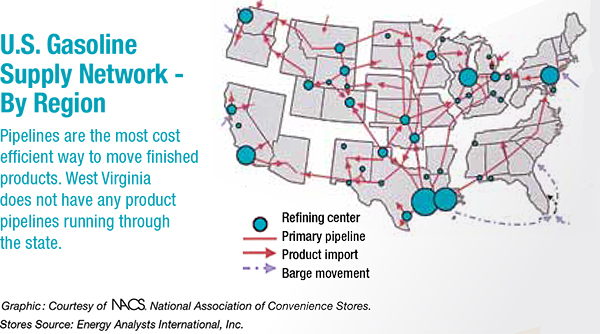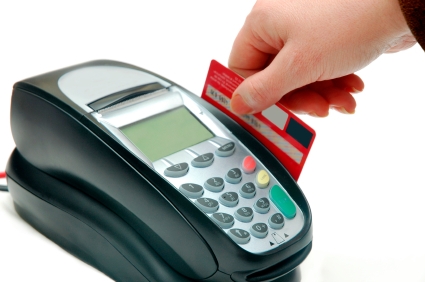Why Can Prices Vary in a Given Market Area?
 While there are multiple factors that influence the price of gasoline, the major components making up what you pay at the pump are crude oil prices along with federal and state taxes. With the WV tax higher than the average, WV retailers have only 9% post-refinery margin to cover the cost of transportation, credit and debit card transaction costs, and any remaining retailer margin.
While there are multiple factors that influence the price of gasoline, the major components making up what you pay at the pump are crude oil prices along with federal and state taxes. With the WV tax higher than the average, WV retailers have only 9% post-refinery margin to cover the cost of transportation, credit and debit card transaction costs, and any remaining retailer margin.
Crude Oil Price
Crude oil is the largest factor in the price of gasoline. Over the past several years, crude oil prices have fluctuated between a low of $18.38 in November 2001 to a high of $145.31 per barrel in July 2008.
Low Gasoline Inventories
As crude oil prices rise, refiners cut back on their crude oil purchases and reduce their gasoline production, thus maintaining less inventory. When inventories are low often times the demand is greater than the supply so the cost of transportation is increased because we go further distances to obtain the product.
Refinery and Distribution Problems
Refinery and Distribution Problems: As witnessed in the aftermath of Hurricane Katrina in 2005, pipeline and refinery problems create tight supplies and spot shortages, which can cause a ripple effect throughout the entire U. S. gasoline market. West Virginia does not have a primary pipeline to bring product into the state. All product delivered to the state has to come by barge and truck, which is a more expensive mode of transportation. In addition, WV only has four product terminals while our surrounding states have as many as 69 (PA). These factors all raise the product cost in West Virginia.
Higher Gasoline Production Cost
Government regulations now require cleaner burning, more expensive gasoline for many areas of the  country. The federal government also mandates the challenging process of ethanol blending. Refiners now produce more than three-dozen different grades of gasoline throughout the country. These factors drive up the cost as well.
country. The federal government also mandates the challenging process of ethanol blending. Refiners now produce more than three-dozen different grades of gasoline throughout the country. These factors drive up the cost as well.
As you can see, the price of gasoline is affected by many factors outside the control of your local gasoline station or convenience store operator. For additional information on this topic, or if you would like someone to speak on the issue, please contact Traci Nelson at (304) 343-5500.
How Much Money Do Businesses Make on Fuel Purchases?

Retailers’ income comprises only about 1% of the final price of a gallon of gas, yet they often feel as if they receive 100% of the blame.
We are the only industry that has a price sign that is big and bold for everyone to see. Not only do our customers, the consumers, see this sign, but our competitors do as well.
More than 97 percent of the nation’s convenience stores selling gasoline are owned or operated by independent companies that rely on sales in their store to run their business. Convenience store retailers dislike high gas prices as much as their customers do. When wholesale gas prices increase, they must fight to attract price-sensitive customers, often at the expense of profits, and watch their already slim gas margins decline while their credit card costs go up.
Retailers are Not “Big Oil”
Most stations sell branded gas, but they are not owned and operated by major oil companies. In fact, 56 percent of convenience stores selling gas are one-store operators, true Mom & Pop operations. It is estimated that only 2 percent of the convenience stores selling gas are owned and operated by a major oil company.
What is OMEGAs position on credit card fees?
 Credit card fees are the convenience and petroleum retailing industry's top pain point.
Credit card fees are the convenience and petroleum retailing industry's top pain point.
In 2008, credit card fees surged another 10.5 percent to reach a record $8.4 billion - nearly three times the level just five years ago and an amount more than $3 billion greater than convenience store industry pretax profits.
We are urging Congress to persuade the credit card companies to explain their fees, practices and policies to retailers and the public.
The National Association of Convenience Stores (NACS), of which OMEGA is a member, is the named plaintiff in a class action suing not only Visa and Mastercard, but also their issuing banks.
Who are OMEGA's officers?
Day-to-day operations of OMEGA are conducted by the organization's president. The role of the president is to assist members in increasing their business effectiveness and profitability by providing resources for education, training and ideas exchanged; encouraging a high level of business ethics and a positive image for the industry; encouraging governmental action beneficial to the industries through active participation of its membership; and, providing cost effective services for the membership.
The West Virginia Oil Marketers & Grocers Association is managed by a dedicated board of directors.
What is the impact of "big box" stores on the community?
OMEGA members are local entrepreneurs employing thousands of West Virginians. Profits from OMEGA businesses stay in the community and strengthen the state economy.
While large national department stores and national chain grocery stores - like Wal-Mart and Kroger - are critical to West Virginia, they can, and do, siphon customers from our state's independent local businesses. In many cases, as you've probably witnessed, even causing community groceries and other retailers to close. In contrast, less than 3 percent of all convenience stores are owned and operated by one of the major oil companies.
OMEGA Press
- WV Oil Marketer & Grocers Association Campaign Raises Over $154,000 For Children in Need of Assistance
- Thank You for Making the 2024 Jan Vineyard Charity Golf Outing a Success!
- Join the GameChanger July Campaign: Empower Our Youth, Prevent Substance Misuse
- WV Oil Marketer & Grocers Association Campaign Raises Over $137,000 For Children in Need of Assistance
- WV Oil Marketer & Grocers Association Campaign Raises Over $132,000 For Children in Need of Assistance
NGA News
- NGA Applauds Passage of Funding Bill Addressing Major Affordability Issues and Competition
- Rocco Cammarota Wins Best Bagger Championship at The NGA Show
- Women Grocers of America President Kristin Popp Honored as WGA Woman of the Year at The NGA Show
- Walt Churchill’s Market Honored with National Grocers Association’s Peter J. Larkin Award for Community Service
- National Grocers Association Recognizes Creative Choice Awards Winners for Outstanding Marketing and Merchandising
CSP Fuel News
- Trucker Path names a Toot 'n Totum Food Stores in Stratford, Texas, 2026’s top truck stop in America
- Linda Toth is named executive director of Conexxus
- Christina Mathisen joins Convenience and Energy Advisors as vice president of marketing
- These Super Bowl ads feature products sold at convenience stores
- Spinx partners with Tote.ai






